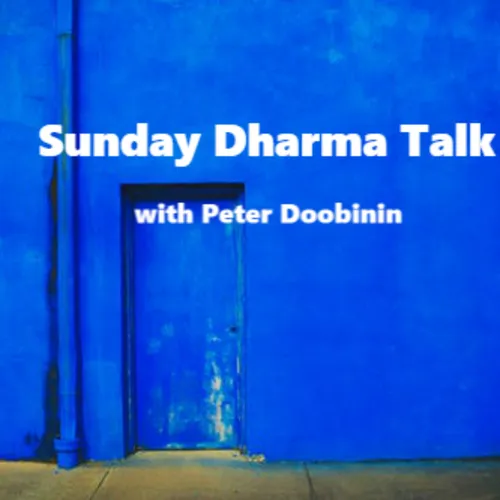
Sunday Dharma Talk
A dharma talk given by Peter Doobinin offered weekly on Sunday.
- Update frequency
- every 7 days
- Average duration
- 37 minutes
- Episodes
- 110
- Years Active
- 2023 - 2025

Shaping Your Life
As the Buddha teaches, we shape our lives, in the direction of a greater happiness, by learning to use thinking in a skillful way. As Peter Doobinin explains in this dharma talk, if we can learn to …

Thought Worlds
Most beings spend most of their lives in thought worlds, lost in thought. The practice of the dharma, as the Buddha explained, is to abandon these thought worlds. In this talk, Peter Doobinin expli…

The Conditioned & the Unconditioned
The Buddha's teachings guide us to a greater happiness: a happiness that's not dependent on conditioned things, a happiness that's reliable, a happiness that's true. In this dharma talk, Peter Doob…

Train for Peace
As dharma students, we make a determination to train for peace. In this talk, Peter Doobinin explains the elements of this profound training. As the Buddha tells us, the greatest happiness is peace…

Voices in the Mind
We change by changing how we think. All that we are, the Buddha tells us, begins with our thoughts. In this talk, Peter Doobinin describes how we learn to change by changing our habitual ways of th…

What the Heart Wants
As dharma students, we learn to follow the heart. We learn to understand what the heart wants. We learn to discern what it is we need to do so that we know happiness of heart. In this talk, Peter …

Joy of Life
In following the path of the Dharma, we learn to know the joy of life. In this talk, Peter Doobinin, explains how, when we reflect skillfully on the truth of the impermanence, it leads us to an appr…

The Path Is a Path
In this talk, Peter Doobinin, discusses what it means to be on the Buddha's path. As he explains, in being on the path, we're asked to engage in an ongoing process of moving forward. The dharma tal…

Lessons in Skillful Thinking
All that we are, the Buddha tells us, begins with our thoughts. For the student of the dharma, the task is to abandon unskillful thoughts and to cultivate skillful thoughts. In this dharma talk, Pe…

Equanimity, Acceptance & Wisdom
In this dharma talk, Peter Doobinin takes a close look at the skill for being mindful of emotions, including blatant and subtle emotions. He describes the role of equanimity and acceptance in bringi…

Priorities for Life
What are our priorities for our dharma practice? What are our priorities for life? How can we change our priorities? In this talk, Peter Doobinin discusses these questions; questions that dharma s…

Noble Escape
In making a noble escape, dharma students seeks escape from the prisons of painful thought worlds, from habitual patterns of desire and aversion, from ways of living that can't bring a reliable happi…

The Happiness of Morality
In this dharma talk, Peter Doobinin describes how the development of ethical conduct - the practice of non-harming - leads to happiness of heart. In the talk, Peter explains why it's important to le…

The Path of Truthfulness
As Peter Doobinin explains, spiritual growth depends on our ability to be truthful. About ourselves. About our habitual attitudes. In this talk, Peter describes how we develop in truthfulness; and…

Changing Your Attitude
Much of our capacity to find a greater happiness in life depends on the degree to which we're able to change our attitudes. The dharma student learns, by developing her skill, to abandon unskillful …

Finding the Light
Our dharma practice is one of gradually letting go of that which obscures the heart. As we develop in concentration and insight, we're more and more able to access the heart, to find the light withi…

Developing a Sublime Attitude
What is our attitude? As Peter Doobinin explains, being able to develop a sublime attitude is crucial to achieving good results in meditation ... and to knowing a greater happiness in life. In this…

Suffering & the End of Suffering
As the Buddha, perhaps famously, said, he taught, "Suffering and the end of suffering." What does this mean...? As Peter Doobinin explains, as dharma students we come to understand that suffering a…

Be Who You Are
In practicing the dharma, we're learning that we don't have to "be somebody." Instead our practice, as Peter explains in this talk, is about learning to be who we are. Each of us is uniquely differ…

Being In Rhythm
Not an intellectual or academic process, dharma practice is a process of coming into rhythm. In "coming out of the head" and into the body, we move toward having a felt experience of life. More and…